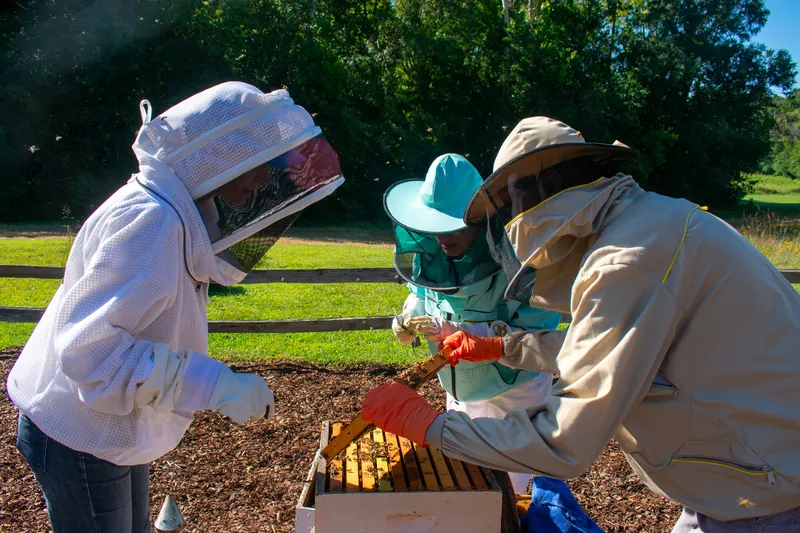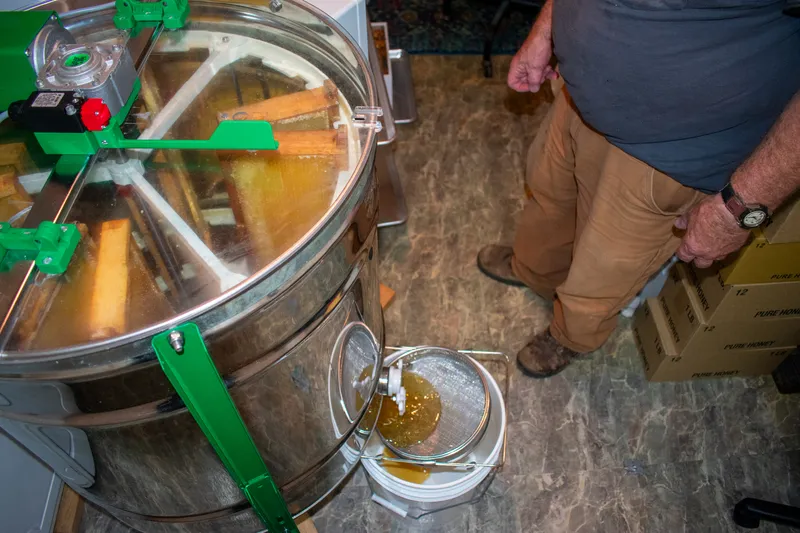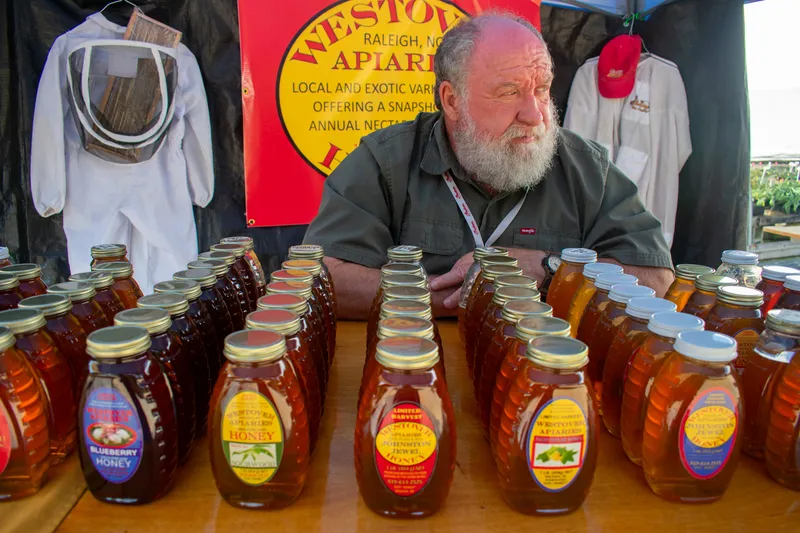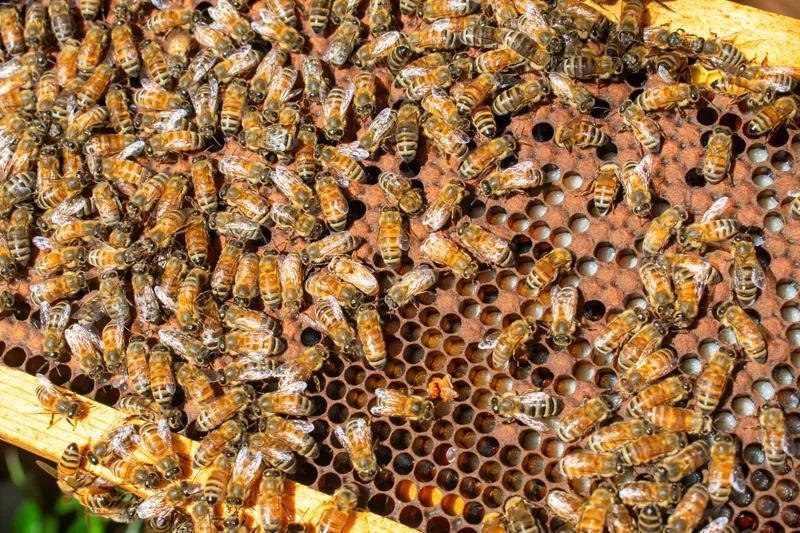On a warm day in the spring, when you look at a bright flower and see a bee dancing around on the inside of the plant, that creature is likely just making a stop on a long journey before it returns to its home — its hive. But odds are, that hive might not be the structure in a tree you are thinking of. It very well might just be the result of someone’s hard work right in their backyard.
Apiculture — the technical term for beekeeping — is a major industry across the state of North Carolina. Many counties — over 80 out of the 100 in North Carolina — and the state as a whole, have their own beekeeping associations.
The North Carolina State Beekeeping Association has over 4,000 active members across the state, making it the largest organized association for beekeepers in the country. And North Carolina, in general, has somewhere close to 15,000 beekeepers — whether it be a person growing a new hobby, an individual understanding the science behind the craft or someone attempting to make a living out of the process — according to North Carolina State University.

Beekeepers from Orange County work together to inspect frames. Orange County Beekeepers Association, one of several beekeeping associations across the state, has over 200 members. Photo by Ellie Kollme.
Because of the multitude of motivations behind beekeeping, NCSU even has an extensive apiculture program to further the understanding of honey bee biology and to improve bee management.
Jennifer Keller, research specialist and apiculture technician at NCSU, said there are still a lot of mysteries surrounding beekeeping — like why some colonies excel in their lifespan more than others — that scientists are still trying to understand in their research. However, Keller and her colleagues see the clear necessity of honey bees in our world.
“Honey bees, as well as other native bees, are very important for pollinating to produce good crops, and even some of the crops that are not dependent on bees will have an added benefit from the pollination of bees,” she said. “If there are no honey bees around, they may still produce a crop, but with honey bees, they’ll produce more of that same crop, so that’s better for farmers. Without bees, things wouldn’t be as good — there’s some crops that are dependent on bees that just would not be able to happen as much.”
The importance of honey bees, as well as the niche interest of the craft, is part of why thousands of individuals across the state participate in beekeeping, whether as a hobby or a commercial business.
Beekeeping as a hobby
Lisa Vogel has always had a piece of bees in her life.
When she was a child growing up in the mountains of North Carolina, she remembers her dad — a self-proclaimed honey aficionado — bringing in different kinds of honey for her to try, from sour wood to whipped, all the result of a bee’s hard work.
Then, 10 years ago, out of pure curiosity, she visited the home of a friend who was a beekeeper to see her process.
“I was hooked immediately,” Vogel said. “It was like, I feel like I did this in another life or something. I mean, it was crazy. You know, when you find a hobby that you just instantly love? It was that feeling.”
Now, a decade later, Vogel cares for nine hives on the property of her home in Orange County, North Carolina. And whether she is harvesting the honey-filled frames from her hives or protecting her bees from the common risk of varroa mites, she has several tricks she has learned over the years.

Vogel checks her frames for eggs or mites. She said she treats for mites four times a year. Photo by Ellie Kollme.
Bee risk and tricks
Though a beekeeper should not constantly interfere with their hive, when the bees are at risk, the keeper might have to step in. One of the main risks facing bees right now is the presence of varroa mites, an external parasitic mite that attacks and feeds on honey bees.
While each beekeeper has a different method to protect their hive from this parasite, Vogel said that she checks for the issue once every five weeks during the warm months — which is often one of her only reasons for going into the hive at all.
After doing an inspection, if she finds a significant number of mites, Vogel will treat her hive with a mite medication or an alcohol wash. She said she learned this trick from a North Carolina beekeeper and apiary inspector, Lewis Cauble.
In addition to keeping her hive safe, Vogel has a trick for ensuring the queen bee is alive by looking for eggs on frames. Because while the whole hive is important, the queen has her title for a reason.
“If the queen dies, then the hive dies, possibly — especially if they don’t have any eggs to raise a new queen,” Vogel said. “If they don’t have a queen, they don’t have eggs, and they’re doomed.”
And if that were to occur, one would have to purchase a new queen from a beekeeping shop — like Bailey Bee Supply in Hillsborough — to maintain the integrity of a hive and reduce the risk of losing more bees. Thus, the maintenance of a hive is critical. Having the knowledge to do so is, too, which is why Justin Maness created his Durham-based company, Buddha Bee Apiary.
Maness’s business is built around the idea of him and his employees, like Claudia Roller, managing beehives in clients’ yards and educating individuals on proper practices.
“We just focus on the education and the experience of people getting the opportunity to come out and be in hives with us and see what it’s all about,” Roller said.
Roller studied chemistry at Goucher College in Maryland, and when she first started working for Maness, she had never even seen a hive in her life. But she was intrigued by the scientific aspect of apiculture, and over the past several years, she has become a beekeeper herself, inspecting hives and making sure the pollinators are cared for. She is now even interested in going to school to get a master’s degree in apiculture from somewhere like NCSU to further her knowledge and the research of beekeeping.
Buddha Bee does not sell any honey from their business, but rather focuses on that education aspect and growing the beekeeping industry, as a whole.
“We only harvest honey if the hive is able to handle us taking some,” Roller said. “And then we give it right back to the people who are hosting a hive. So if you have a hive in your backyard, you’re getting your honey right from your backyard.”
Honey production
But while Buddha Bee does not profit from its production, the sticky, sweet golden substance is a major aspect of beekeeping, and keepers like Vogel do share their hive’s product.
“I sell it at different places around Orange County,” she said. “This year I’ll be selling it mostly to friends, and I do a Holiday Market where I sell it as well.”
However, this venture is not about making money for Vogel; in fact, she said she does not make much of a profit at all, especially since she does not extract her own honey — which is a different process entirely.
Extraction is the process of separating honey from beeswax combs to harvest it for use. When Vogel needs this done, she takes her frames to an extractor in Mebane, North Carolina, before she bottles the product.
Vogel said she does not do extraction, not only because she does not have the equipment for it, but because, with her age, the process is too heavy a task for her. For Phil Crump, though, extraction is just another step in his beekeeping process as a whole.
Bees and the economy
Crump has been beekeeping for almost 50 years and, according to Vogel, is a salesman extraordinaire. He primarily sells honey at events through Plant Delights Nursery, a small business in Wake County, North Carolina, and begins the honey process from step one.
From suiting up in protective covering to having hands-on time with the buzzing creatures to harvesting the golden frames, Crump does it all. Then, when he finally reaches the extraction element, Crump has a honed-down method.
“You’re going to take your knife, and it saws, kind of, and you can see how I’m just taking those cappings off,” Crump said as he started the process. “And then I’m just going to go down, and I like to not damage the comb any more than necessary. Some people just get in there and they’ll start digging it. There’s another method that you can use that uses a hot knife and it melts the wax off. But I just think this is the least destructive method, and that’s what I like to do, is not to damage this any more than necessary, so that the bees can repair it or utilize it.”

Crump recovers the honey from the extractor. As it spins, honey flows out of the bottom and is collected in a bucket. Once the honey is produced, Crump uses a honey-filling machine to bottle the honey. Photo by Ellie Kollme.
The harvesting and extraction process allows Crump to produce a profit from selling products at events.
He said that he typically sells a bottle of honey for around $30, and while that might seem like a steep price, with the effort and time that has been put in, at the end of the day, that outcome makes sense and people will buy it.
“I can market my honey in a location where people are already coming to spend money,” Crump said. “They’re already anticipating buying something. This is a nursery that sells rare and unusual plants, so they’re not inexpensive plants. They’re not going to Lowe’s [Hardware]. So that’s a unique component. I can’t make money at the farmer’s market because people from Eastern North Carolina come and they’re selling their honey so cheap I can’t even compete.”

Crump sells his honey eight times a year at Plant Delights Nursery in Wake County. He owns Westover Apiaries and sells more than 16 different types of honey depending on the season. The types of honey produced depend on flowers’ nectar, which affects both taste and color. Photo by Ellie Kollme.
Crump said that the honey production business is hard, but what makes it harder is when these individuals sell their honey for a lower price than what other keepers see fit. This practice hurts people like Crump who try to support themselves through their sales. This way of selling and overharvesting can also create poor beekeeping practices.
Overharvesting occurs when beekeepers remove too much honey from a hive. This leads to colony collapse by depleting a hive’s food stores, forcing beekeepers to rely on supplemental feeding, which can add stress and is not a sustainable practice for the colony’s long-term health — which though is not especially common, it is something Crump tries to avoid entirely.
The community
But Crump said that beyond just the honey harvesting and business of beekeeping, the people make it what it is.
“My interest is honey production, but I’d say at least half of what interests me about beekeeping is the fellowship,” he said. “[I] really enjoy the people. It’s a great group of people. They’re real.”
Vogel said that many of the practices she has learned have been through personal research or from the greater beekeeping community, in general. It is this community that truly defines beekeeping in North Carolina.
And it is that community that has also grown Eva Walker’s interest in the craft, despite being a standout among her peers.
Walker is a senior at Durham Academy Upper School and has been a beekeeper for almost four years. She has a hive at her home in Durham that she maintains with her father, as well as one that she set up at her high school that she uses to help educate other students about beekeeping.
While she is not necessarily in the same age group as many other beekeepers in North Carolina, Walker has still formed various connections. She said that the community is so tight-knit across the state that everyone seems to know each other or is able to bond over this niche hobby.
“Being young, I’m sort of at an advantage, because people want to hear [about it],” she said. “There’s questions of like, ‘Wow, you’re so young, how’d you get into this?’”
So while the motivation behind beekeeping varies for each person — whether for education, a fun hobby, a profession or anything else — the root of the enjoyment of the craft lies in the community and the opportunity to protect, preserve and promote the lives of the creatures that keep nature so bright.
 Stories from the UNC Media Hub are written by senior students from various concentrations in the Hussman School of Journalism and Media working together to find, produce and market unique stories — all designed to capture multiple angles and perspectives from across North Carolina.
Stories from the UNC Media Hub are written by senior students from various concentrations in the Hussman School of Journalism and Media working together to find, produce and market unique stories — all designed to capture multiple angles and perspectives from across North Carolina.



